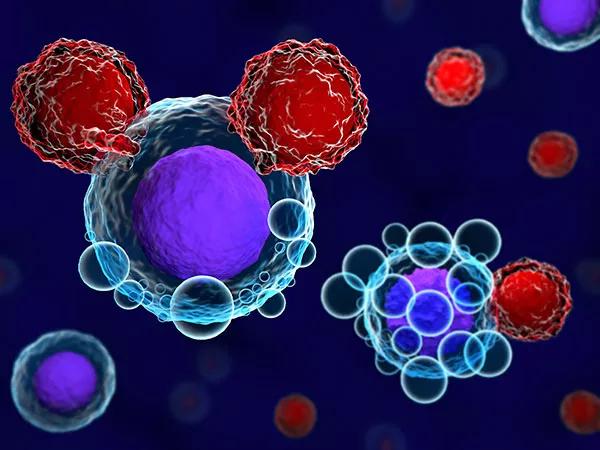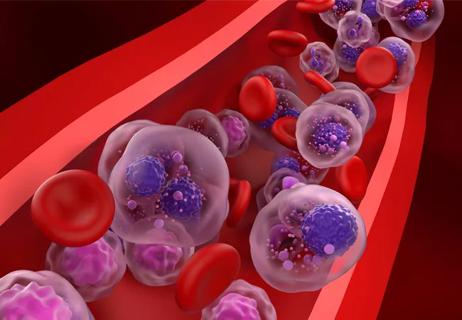Research indicates strong rationale for expanding trial eligibility criteria

The cell-based immunotherapy idecabtagene vicleucel (ide-cel) is safe and effective in relapsed/refractory multiple myeloma, even among many patients with comorbidities, low performance scores or low blood counts.
Advertisement
Cleveland Clinic is a non-profit academic medical center. Advertising on our site helps support our mission. We do not endorse non-Cleveland Clinic products or services. Policy
Ide-cel was the first chimeric antigen receptor (CAR) T-cell therapy approved by the FDA in March 2021 for adult patients with heavily-pretreated relapsed/refractory multiple myeloma after four or more lines of therapy, based on the KarMMa clinical trial. In a national retrospective study involving 11 U.S. academic medical centers, including Cleveland Clinic, researchers found real-world data is in line with the KarMMa clinical trial data in terms of response rates and survival. Notably, of the 159 patients in the real-world cohort, 75% would have been ineligible for this lifesaving treatment in the KarMMa trial, due to comorbidities at the time of leukapheresis.
“A lot of patients who don’t seem to fit standard fitness criteria for certain procedures actually do quite well with cell therapy like ide-cel,” says Jack Khouri, MD, study co-author and hematologist/oncologist with Cleveland Clinic’s Taussig Cancer Institute. “We don’t want physicians to shy away from considering patients in these situations. It’s best to refer them to a tertiary care center like Cleveland Clinic for assessment.”
Virtual consultations are available for patients who may have a difficult time traveling to the clinic. A team of experienced CAR T-cell practitioners meet regularly at Taussig Cancer Institute to review cases. They consider many factors beyond age and ECOG score when evaluating a patient. “We look at the biology of the patient more than the chronology,” says Dr. Khouri.
This involves assessing factors such as the patient’s organ function and what is driving their performance score. Many patients with multiple myeloma have low blood counts or inadequate ECOG status, but as Dr. Khouri explains, this may be due to active disease. “If we can control the disease, we can often improve blood counts and reduce a patient’s fatigue that is contributing to poor performance.”
Advertisement
For the multi-center study, data was retrospectively collected from patients with relapsed/refractory disease who underwent leukapheresis as of February 28, 2022, with intent to receive standard-of-care ide-cel. The median progression-free survival was 8.5 months (95% CI, 6.5 to not reached), and the median overall survival was 12.5 months (95% CI, 11.3 to not reached).
A second cell therapy called ciltacabtagene autoleucel (cilta-cel) was approved for R/R multiple myeloma in February 2022, yet receiving these therapies isn’t always easy.
Due to high demand for and limited production of CAR T-cell therapies, there is a waiting list to receive the treatment. This is one reason it’s necessary to refer patients early. “We encourage physicians not to wait until a patient is actively relapsing on their fourth line of treatment before referring them for consideration for CAR T-cell therapy,” says Dr. Khouri. “The ideal time to refer a patient is when you’re just starting to look at switching them to their fourth line of treatment.”
There are other treatment options, such as bispecific antibodies, for patients in this situation, but one advantage of CAR T-cell therapies is that they’re “one and done”. If a patient responds, they no longer need additional treatment while they remain in remission, whereas patients receiving bispecific antibody therapies typically require continuous treatment.
In the study, patients who previously received B-cell maturation antigen-targeted therapy, those with ECOG performance status of 2 or greater at the time of lymphodepletion and younger patients had shorter progression-free survival after ide-cel. These findings were primarily related to the more aggressive nature of myeloma in patients with high-risk cytogenetics and worse ECOG status, Dr. Khouri explains.
Advertisement
The 11 participating centers are continuing to work together to better understand disease-related factors, such as lymphocyte count and patient ethnicity, that may impact outcomes. “The large data sets gathered for the study give us a lot of statistical power to better understand how these therapies work, which patients may experience more toxicities and who is likely to benefit the most from particular treatments,” says Dr. Khouri.
Learn more in our podcast episode about IDe-CEL CAR T-cell therapy.
Advertisement
Advertisement

Phase 2 study brings pivotal advances in treatment efficacy and safety for the most challenging-to-treat population

Making sense of the fast-moving treatment landscape

Explaining common misconceptions about chimeric antigen receptor therapy

Clinicians share practices to streamline initiation of care

Prediction and bioinformatic data could prove valuable for therapeutic interventions targeting this malignancy

Findings from large database important to inform clinical practice

Study of 401,576 patients reveals differences in cancer burdens as well as overall survival

Despite sicker patients, response rates of teclistamab in a real-world study were similar to those from a pivotal clinical trial